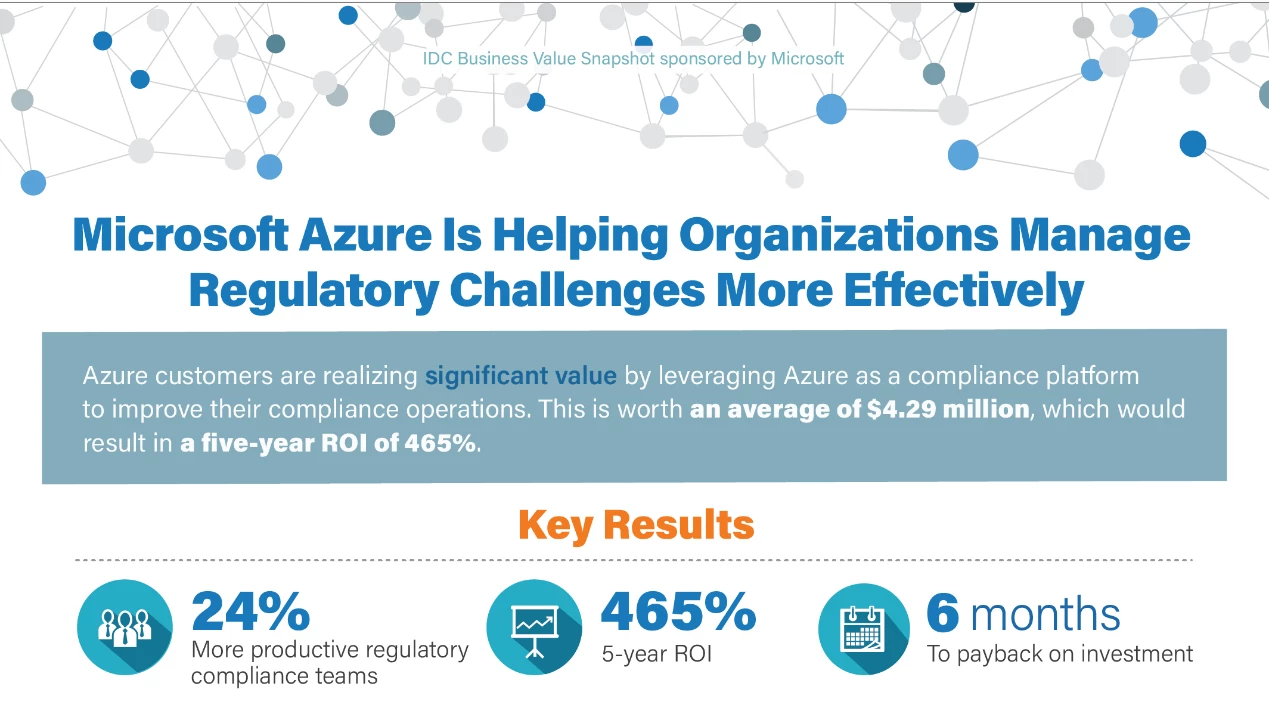Announcements, Azure Blueprints, Azure Policy, Management and Governance, Security
Measuring your return on investment of Azure as a compliance platform
Posted on
2 min read
Today we’re pleased to introduce the release of Microsoft Azure is Helping Organizations Manage Regulatory Challenges More Effectively, a new International Data Corporation (IDC) white paper based on original research by IDC and sponsored by Microsoft. IDC studied Azure customers who are using Azure as a platform to meet regulatory compliance needs, with a special focus on government, healthcare, and financial customers. Azure Policy was cited by customers as having an important impact on meeting compliance obligations.
IDC found that these customers are realizing significant benefits by leveraging Azure capabilities to make their regulatory and compliance efforts more effective. Significant findings of research include:
• Five-year return on investment (ROI) of 465 percent, worth an average of $4.29 Million.
• Six-month payback on investment.
• 47 percent reduction in unplanned downtime.
• 35 percent reduction in compliance-related penalties.
• A 24 percent increase in productivity for regulatory compliance teams.

Research summary findings
“Study participants reported use of Azure as a compliance platform helped them carry out their day–to-day compliance responsibilities more effectively. Azure helped them better manage spikes in the workload, enabled faster access to (and analysis of) data during audits, and reduced exposure to risk based on the strong internal controls of Azure.”
Specific benefits outlined by study participants in the research included:
- Better workload management and reduced risk: “We are able to stay on top of what we are doing, and we can now handle growth or spikes in the workload. Azure has lessened our exposure to risk because of its strong internal controls.”
- Increased audit efficiency: “Azure has absolutely helped with audits. For example, it allows us to have much better access to our data, and faster analysis of that data for our audits. Compliance teams save time as a result.”
- State-of-the-art security: “Azure has lessened compliance risk exposure because its … security systems are state of the art. There is less chance of any kind of data being compromised through intrusion.”
About half of the organizations surveyed were using Azure Blueprints, which enable tenants to deploy a repeatable set of Azure resources that implements and adheres to common compliance standards, including ISO 27001, PCI DSS, and NIST SP 800-53. Benefits cited by customers from using Azure Blueprints included better visibility and remediation of threats and vulnerabilities, guidance documentation, and automation scripts for hosting web applications.
One customer said of Azure Blueprints in the research, “The architecture is already set up and is very sophisticated (for example, there are different app services, load balancers, and the database are all set up). We don’t have to spend a lot of time on architecture. Other benefits are the resource manager, security management, logging and auditing, activity logs, and diagnostic logs. It’s a great resource for support of our ongoing compliance requirements.”
Learn more about how to deploy Azure Blueprints today.
Read more about the IDC findings by visiting the article.